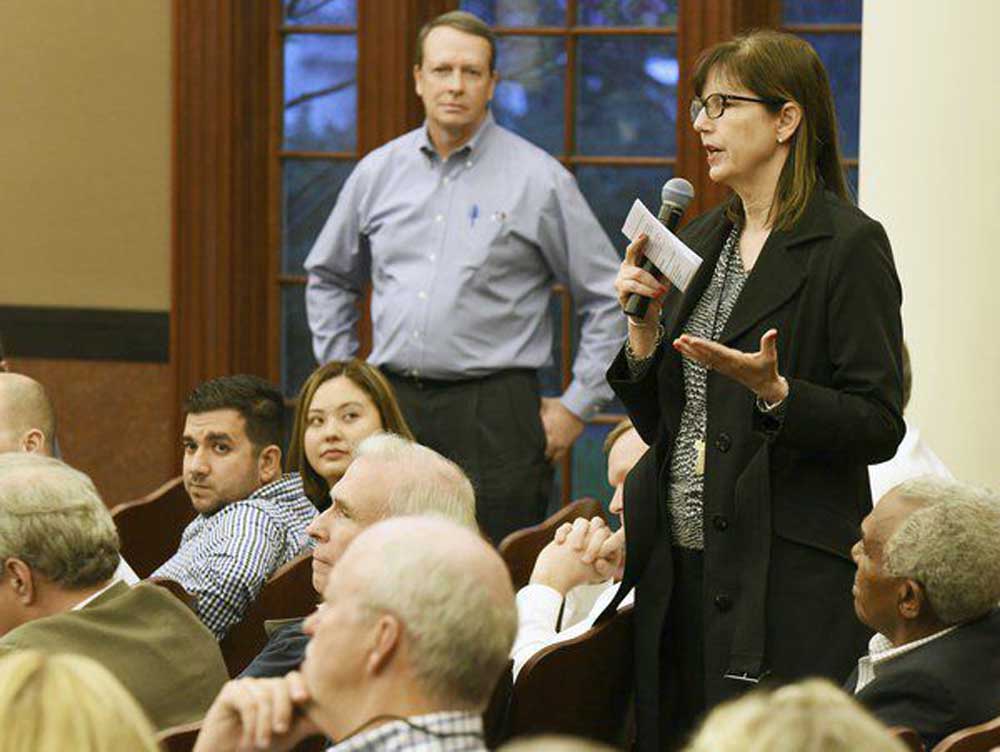‘We’re here to write Dalton’s future’: Study finds challenges and opportunities for city
Published 11:43 am Friday, March 10, 2017

- Matt Hamilton/The Daily CitizenPam Partain asks a question during a town hall meeting on Tuesday at Dalton City Hall.
DALTON, Ga. — Whitfield County has plenty of well-paying jobs, according to a community assessment.
But the study, sponsored by the Greater Dalton Chamber of Commerce and the Greater Dalton Strategic Planning Group, also found that a many of the people who hold those jobs don’t live in Whitfield County.
Trending
The study compared Whitfield County to nine other communities across the Southeast: Bartow County (Acworth); Bradley County, Tenn.; Catawba County, N.C.; Davidson County, N.C.; Floyd County (Rome); Hall County (Gainesville); Lee County, Miss.; Morgan County, Ala.; and Randolph County, N.C.
“These are counties that are roughly similar to us in population and many of them we compete with for economic development projects,” Chamber President Rob Bradham said during a presentation of the study Tuesday night at Dalton City Hall. About 200 people attended the town hall meeting.
Whitfield County had the fourth-highest average wages among the 10 counties, with 17,767 jobs paying $40,000 or more.
But it had the second-lowest per capita income.
How can that be?
The study found that 62 percent of those holding a job in Whitfield County that pays $40,000 or more live in another county.
Trending
“There’s this idea out there that this county doesn’t have any jobs that pay well,” said Chuck Dobbins, co-chairman of the steering committee of the Greater Dalton Strategic Planning Group, an organization of government leaders and others spearheading a long-range plan for the community.
“This study shows that we do have those jobs. But it also shows that many of the people who hold them work here but don’t live here,” he said.
The study found Whitfield County ranked No. 1 among the 10 cities in business climate, which was measured by tax rates, regulations and other costs of business.
But that was about the only measure where the area ranked highly.
Whitfield County ranked 10th, for instance, in workforce dynamics.
All 10 counties ranked below the national average in educational attainment. But Whitfield County ranked last among the 10 in the percentage of the population 25 and older with a bachelor’s degree and last in the percentage of those 25 and older with an associate’s degree.
Whitfield County also ranked at the bottom of the 10 in innovation and entrepreneurship. It has fewer self-employed persons as a share of county population that any in the study. It has the lowest proportion of small businesses (defined as having fewer than 20 workers). It has the lowest proportion of businesses less than 10 years old.
“In our survey of local residents, they said that Dalton was built on entrepreneurship but there was a sense that entrepreneurial energy has faded,” Bradham said.
Bradham said what entrepreneurship remains is largely centered in the Hispanic community.
Whitfield County had the third-highest rate of minority business ownership in the 10 counties and the fourth-highest rate of minority business growth.
Bryan Hair, steering committee co-chairman, said the community can look at these findings as problems or as opportunities, but he considers them opportunities.
The study and the community survey that went along with it are the first two parts of a four-part process.
Committee members will now develop a multi-year strategy for addressing these issues and creating a vision for the community.
“We probably aren’t come up with a list of 20 things to do. More likely, we are going to come up with four or five things that can be done and that can have an impact,” Hair said.
Bradham said the plan won’t focus on just one of the issues identified by the study but will be a multi-pronged approach addressing multiple issues.
“We’re here to write Dalton’s future,” he said.
To read the results of the study and community assessment, go to www.daltonstrategy.com.


